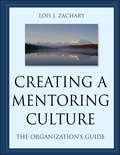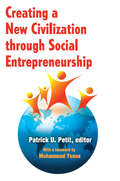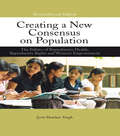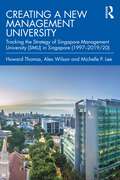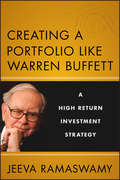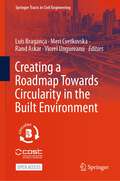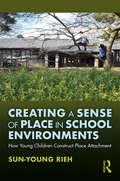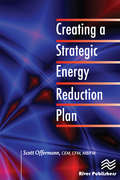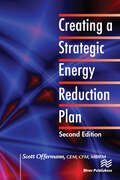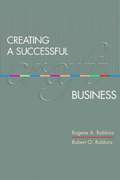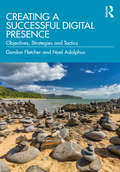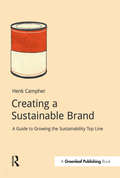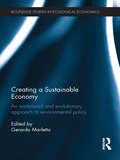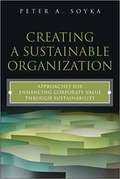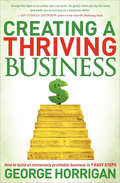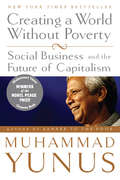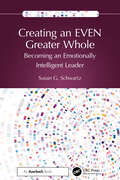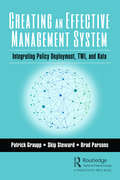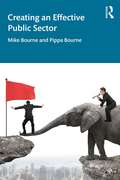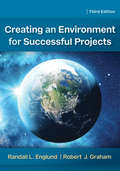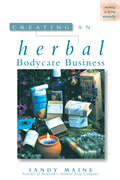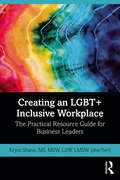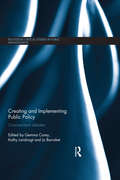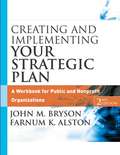- Table View
- List View
Creating a Mentoring Culture
by Lois J. ZacharyIn order to succeed in today's competitive environment, corporate and nonprofit institutions must create a workplace climate that encourages employees to continue to learn and grow. From the author of the best-selling The Mentor's Guide comes the next-step mentoring resource to ensure personnel at all levels of an organization will teach and learn from each other. Written for anyone who wants to embed mentoring within their organization, Creating a Mentoring Culture is filled with step-by-step guidance, practical advice, engaging stories, and includes a wealth of reproducible forms and tools.
Creating a New Civilization Through Social Entrepreneurship
by Patrick PetitHumanity is confronted with the gravest financial crisis and economic recession since the Great Depression. Political leaders, national ministries of finance, and central banks around the world are trying to prop up their countries' sinking economies and arrest a downward economic spiral by innovative financial rescue and bank bailout plans, as well as economic stimulus and recovery packages. These measures are being taken to reestablish trust in the economy and to trigger an economic revival. Despite these efforts, stagnation seems imminent, as uncertainty leads businesses and consumers to place spending and investing decisions on hold.Social entrepreneurs are essential to the restoration of a sustainable planet and the improvement of lives of billions of people, especially of those living in extreme poverty. Therefore, social entrepreneurs deserve further recognition and support by the international community - by governments, multinational companies, and philanthropic organizations. Creating a New Civilization through Social Entrepreneurship highlights the global movement of social entrepreneurship and some of the leading organizations and individuals that are advancing this citizen sector movement. The volume presents examples of innovative people that are tackling major social problems and triggering systemic change throughout the world today.
Creating a New Consensus on Population: The Politics of Reproductive Health, Reproductive Rights, and Women's Empowerment
by Jyoti Shankar SinghPopulation growth, reproductive health and reproductive rights are amongst the most pressing issues facing governments and the international community. Since the world's governments agreed for the first time on far-reaching and enlightened population policies at the 1994 International Conference on Population and Development (ICPD) in Cairo, a good deal of progress has been made on these issues, but major challenges remain. This fully updated edition of Creating a New Consensus on Population charts international progress on efforts to address population and development, reproductive health, reproductive rights, religion, contraception and the empowerment of women. Historical coverage includes the lead up process to the ICPD, the conference itself and the global consensus and the ICPD Programme of Action that resulted. The book then turns to how population issues have developed over the past decade and a half including follow-up and implementation at the international level by the United Nations Population Fund (UNFPA) and other UN agencies and organizations. Key international events are covered including the 1999 ICPD+5, Millennium Summit 2000, ICPD+10 and the 2005 MDG+5 as well as relevant regional events. The book also examines the reorientation of policies and programmes and implementation at national levels across the world. Crucially, it looks at emerging issues and partnerships including the increasing role of NGOs, women's groups, youth groups, foundations, public-private partnerships and other non-state stakeholders. Written by Jyoti Shankar Singh, former ICPD Executive Coordinator, this is the definitive account of how the international community has engaged with population issues and policies and it offers insight into both the ongoing challenges as well as how an international consensus can be forged on crucial global issues. It is essential reading for all those involved in population, health and development issues and policies world-wide.
Creating a New Management University: Tracking the Strategy of Singapore Management University (SMU) in Singapore (1997–2019/20)
by Howard Thomas Alex Wilson Michelle P. LeeThis book provides an in-depth exploration of one of the most significant success stories of the development of an entrepreneurial university in recent times as well as its role within society and the economy. Written by leading business school Dean and scholar, Howard Thomas, and Alex Wilson and Michelle Lee, the book tracks the genesis of the idea of a third local university in Singapore to its fruition as Singapore Management University (SMU). It provides important insight and lessons for senior university and business school leaders, as well as regional and national governments. The increasing emphasis on the importance of innovative, entrepreneurial universities for social and economic growth has prompted this review of the strategy and impact of SMU. The book addresses the strategic evolution of SMU itself, from its origins as a single business school, into a multi-school, social science-focused school of management. It examines whether it has fulfilled its promise as an entrepreneurial university and a change agent in the context of Singapore’s strong economic growth and educational strategy. More broadly, it explores how investment in education, and entrepreneurial universities such as SMU, can facilitate and enhance economic growth. University leadership teams, policy analysts, faculty and students of entrepreneurship education, education management and policy in general, and business education in particular, will find this book an invaluable insight into building a genuinely entrepreneurial university.
Creating a Portfolio like Warren Buffett
by Jeeva RamaswamyThe practical guide to investing the Warren Buffett wayCreating a Portfolio like Warren Buffett: A High Return Investment Strategy highlights actual trades author Jeeva Ramaswamy has successfully executed using principles established by investment guru Warren Buffet. Clearly explaining how Buffett's principles can be used to make specific investments the book, unlike other investment guides, also clearly explains how to apply Buffett's exit strategies as they pertain to holding or selling positions.Giving readers a complete overview of Buffett's methodologies and how to apply them, the book is a step-by-step stock research checklist and comprehensive guide to investing and managing a successful stock portfolio. It includes detailed instructions to:Determine where to search for stock prospectsThoroughly research stocks using a stock research checklistConfidently make buy and sell decisionsExpertly manage your portfolioPacked with specific stock examples, real-life calculations, and expert tips, Creating a Portfolio like Warren Buffett is your guide to harnessing the market savvy of an investing legend.
Creating a Roadmap Towards Circularity in the Built Environment (Springer Tracts in Civil Engineering)
by Viorel Ungureanu Luís Bragança Meri Cvetkovska Rand AskarThis open access book summarizes the research being pursued as part of the COST Action CA21103 titled "Implementation of Circular Economy in the Built Environment" (Circular B), which aims to define the methodology to develop a common circularity framework for inclusive application and assessment in new and existing buildings to support decision-making for all value chain stakeholders and appraise the implementation level of the European Circular Economy Action Plan (CEAP). The Action is increasingly gaining interest worldwide, bringing multidisciplinary young and experienced researchers together to share the latest studies and develop new knowledge. Consisting of 17 chapters corresponding to the conference themes, the book analyses and discusses topics such as Circular Economy (CE) best practices, design strategies for circular buildings, circular materials and products, adaptive reuse of existing buildings, recovery and reuse of salvaged materials and products, case studies of current applications and trends, barriers against CE implementation in buildings, efficient waste and circular resource management, circular lifecycle management and decision making, stakeholders relationships, CE supporting policies and barriers, circular business models, criteria, KPIs and assessment models for circular buildings, CE criteria in sustainability frameworks, digitalization and BIM for enhanced circularity of buildings and building materials, and standardization of CE definitions in buildings.
Creating a Sense of Place in School Environments: How Young Children Construct Place Attachment
by Sun-Young RiehCreating a Sense of Place in School Environments guides its readers to the characteristics that tend to generate a sense of place through children’s vivid descriptions of their school and provides a body of critical information that can be employed to design a better school environment that can imprint cherished childhood memories. The childhood school environment calls for special attention regarding the sense of place it creates. The sense of place in childhood both affects children's current quality of life and frames their lasting world view. It is well known that children's cognitive development is closely related to their place attachment to their surroundings, and that children’s adaptation to a given environment depends on how such place attachment can be created. Therefore, it is natural that people’s identity in the world is the accumulation of their experience of place while in childhood. Cross-checking between the imprint of adults' memories of places in school and children’s current "lived experience" of their favorite school place confirmed that certain spatial configurations, which the author herein refers to as "place generators" can generate positive attributes of physical settings that construct a sense of place and last as lifelong memories. It is an ideal read for academics, students, and professionals.
Creating a Strategic Energy Reduction Plan
by CEM OffermannThis book outlines a simple and easy-to-follow process for auditing building operation to identify and reduce energy consumption. It explains the operational and cost-based opportunities, assessing the current conditions, analyzing the opportunities, and reporting the findings and documenting the plan. The book discusses the different building components and systems and how they affect energy efficiency and describes the operational energy efficiencies that can be gained by implementing no cost changes or alternate maintenance activities already funded. Capital improvement opportunities, and evaluating Return on Investment and life cycle replacement of equipment are also covered.
Creating a Strategic Energy Reduction Plan
by Scott OffermannThis book provides a simple, easily followed process for auditing building operations to identify and reduce energy consumption that leads to measurable carbon reduction. The crucial steps of this process involve assessing the facility’s current conditions, understanding, and analyzing the operational and cost-based opportunities that increase carbon output. Taking this information to report the findings and then document a multiyear energy and carbon reduction plan. The book discusses the full scope of building components and systems, including how each system affects energy efficiency. It describes the operational energy efficiencies that are gained by implementing no-cost changes or alternative maintenance activities already funded. The book includes the process for identifying capital improvement opportunities, along with evaluating return on investment and life cycle replacement options for equipment. The four-step process described in this book will serve as a valuable tool for every building operator seeking to improve energy performance and reduce carbon output.
Creating a Successful Craft Business
by Rogene A. Robbins Robert RobbinsFrom writing a business plan and financing an idea to choosing the most cost-efficient production method and best-suited sales approach, Creating a Successful Crafts Business provides a sound blueprint for turning a beloved hobby into a lucrative career. Written by two experienced craftspeople who have been through the trials, tribulations, and triumphs of running a crafts business, readers will learn, step by step, how to negotiate with bankers, choose the ideal retail location, promote the business on-line, expand into lucrative new markets, and much more. Filled with the infectious spirit of people who have "been there," this down-to-earth book will bring fledging craft businesses to new levels of profits and success.
Creating a Successful Digital Presence: Objectives, Strategies and Tactics
by Gordon Fletcher Noel AdolphusIncreasingly graduates, and anyone who is entering employment, need an individual digital presence to stand out and showcase themselves to secure their first professional role. This book takes an employability approach to encourage those currently studying, or about to enter the world of work, to develop a set of skills that enables them to recognise and deliver an effective digital presence, firstly for themselves and then for the organisations who would employ them. It does not assume any prior technical knowledge and emphasises the value and benefits of creating a presence to actively participate in the digital economy. By structuring the chapters incrementally, the reader is guided through the development of their own presence while also being given the concepts and tools that will enable them in the future to scale this activity to suit the needs of a startup, an SME or a social business. By using well-established business principles to design a strategy, the reader is guided through the creation of a personal Theory of Change that will enable them to turn an abstract goal into an individual digital presence through a defined series of stages and intermediate change objectives. The book then proposes a series of tactics to draw out concrete actions. A range of examples and case studies from around the world feature in each chapter to showcase the range of different types of digital presence that can be created. By using a strategic and systematic process, this book draws together academic thinking with tangible and highly practical outcomes. It is essential reading for advanced undergraduate and postgraduate students studying any discipline related to the digital world, particularly digital marketing and digital business, entrepreneurship and strategy, as well as those taking employability and personal professional development programmes.
Creating a Sustainable Brand: A Guide to Growing the Sustainability Top Line (Doshorts Ser.)
by Henk CampherSustainable brands may have started as "doing less harm" and shaving costs off the bottom line. But brands today, supported by over a decade of phenomenal changes in sustainability, are looking for the holy grail of sustainable business – a fusion of products and branding that can actually drive sustainability and grow the business top line.Consumers have already joined the party. Just look at TOMS, Patagonia, Method, Seventh Generation, Dove and many more. What is missing isn’t the consumer but a better understanding of what fully-rounded consumers really want in their quest for a healthy, fulfilling life.This guide by sustainable brand expert Henk Campher is the model for creating a sustainable brand that people can trust, buy and above all, advocate for. Campher cuts through the myths and noise to offer an experienced expert's 101 for creating an irresistible brand, clearly setting out: what makes a product or service sustainable; the basic elements of sustainable branding strategy and a deep understanding of how consumers connect with a brand; an original model for assessing the sustainability of your brand, and; a host of examples of sustainable brands, drawing on the author's firsthand experience as part of the team at Edelman and Oxfam and founder of the Nelson Mandela initiated Proudly South African campaign.
Creating a Sustainable Economy: An Institutional and Evolutionary Approach to Environmental Policy (Routledge Studies In Ecological Economics Ser. #21)
by Gerardo MarlettoThis book is designed for those scholars, students, policy-makers – or just curious readers– who are looking for heterodox thinking on the issue of environmental economics and policy. Contributions to this book draw on multiple streams of institutional and evolutionary economics and help build an approach to environmental policy that radically diverges from mainstream prescriptions. No 'silver bullet' solutions emerge from the analyses. Even market-based tools – such as green taxes or tradable pollution permits – are bound to fail if they are not incorporated into an integrated, multi-dimensional and multi-actor policy for structural change.
Creating a Sustainable Organization: Approaches for Enhancing Corporate Value Through Sustainability
by Peter A. SoykaOrganizations that prioritize environmental, health, and safety (EHS) issues are well placed to attract better customers, better talent, and today's growing number of socially responsible investors. But, to gain these benefits, companies must choose the right sustainability strategies, and then manage and measure them well. Now, leading business sustainability consultant Peter Soyka offers a complete and actionable guide to driving greater value through sustainability. In Creating a Sustainable Organization, Soyka bridges the disparate worlds of the EHS/sustainability professional and the investor/analyst. Readers will learn what the evidence says about linkages between sustainability and value… how to manage key stakeholder relationships influencing corporate response to EHS and social equity issues… how to effectively manage sustainability throughout the business… how to evaluate sustainability posture and performance from the standpoint of external investors and internal management… how to maximize the influence of organizational actors focused on sustainability, and much more. This book will be invaluable for all environmental, health, and safety decision-makers and professionals concerned with improving sustainability and value; for executives and strategists seeking long-term competitive advantage; for stock analysts evaluating potential investments; and for researchers and MBA candidates currently studying the techniques and potential of corporate sustainability.
Creating a Thriving Business: How to Build an Immensely Profitable Business in 7 Easy Steps
by George HorriganA practical plan for entrepreneurs that &“takes you by the hand and leads you to success as a business owner&” (Jay Conrad Levinson, national-bestselling author of Guerrilla Marketing). Most business owners and leaders have expectations for today, hopes for tomorrow, and dreams for down the road. But how do they get from here to there? Using a systematic, structured methodology build upon George Horrigan&’s experience with over 1,200 businesses over the past seventeen years, Creating a Thriving Business shows business owners, leaders, and managers how to solve real-world problems and get the kind of results they want. With a proven, practical, and comprehensive methodology that is simple to understand, straightforward, easy to implement, and extremely effective, readers can achieve their goals faster, thereby turning today&’s problems into tomorrow&’s promise. Creating a Thriving Business shows, step by step, how to create a successful business by reducing the guesswork, trial and error, and uncertainty associated with trying to beat the competition and increase profitability.
Creating a World Without Poverty: Social Business and the Future of Capitalism
by Muhammad YunusIn this newly updated national bestseller, Nobel Peace Prize?winner Muhammad Yunus outlines his vision of a new business model that combines the power of free markets with the quest for a more humane world.
Creating an EVEN Greater Whole: Becoming an Emotionally Intelligent Leader
by Susan G. SchwartzLeadership is not a solo sport; it’s about people and how they engage with one another. True leadership isn’t driven by an individual’s ego, but by the ability to connect, understand, and inspire others. Emotional Intelligence (EQ) enables leaders to shift their mindset, empowering their teams to reach their highest potential. Creating an Even Greater Whole: Becoming an Emotionally Intelligent Leader offers managers a fresh perspective and practical tools to navigate their leadership journey.
Creating an Effective Management System: Integrating Policy Deployment, TWI, and Kata
by Patrick Graupp Skip Steward Brad Parsons"The decades of experience-based wisdom that Graupp, Steward and Parsons share will set you on a new path to a more joyful organization and the tangible results it will produce." Rich Sheridan, CEO, Menlo Innovations; author of Joy, Inc. and Chief Joy Officer "A fine book by skilled practitioners that integrates Kata and TWI, with Strategy Deployment in pursuit of an integrated management system. Well done, Skip, Brad and Patrick." Pascal Dennis, president, Lean Pathways Inc.; author of Lean Production Simplified, Andy & Me, Andy & Me and the Hospital, Getting the Right Things Done, and The Remedy "In this practical and engaging book, Patrick Graupp, Skip Steward, and Brad Parsons give a concise and extremely clear explanation of what systems thinking looks like in a healthcare setting. And they do so in a way that translates easily to any type of organization. Highly recommended!" Alan Robinson, co-author of Ideas Are Free and The Idea-Driven Organization Despite the vast library of knowledge on Lean tools and models, the majority of Lean implementations fail to sustain themselves over time for lack of a functioning management system. In turn, when organizations try to apply a prescribed, one-size-fits-all, management system they inevitably find that what works for others may not work quite as well in their unique situation. Putting the right pieces in the right places is the prime challenge for every organization and no two successful management systems will, or should, be the same. This book provides and examines core principles that must be in place for an organization to find what an effective management system should constitute for them. It outlines key elements and how they work together as a necessary system to achieve overall success. Based on their extensive experience with organizational development and hands-on leadership in policy deployment, TWI and Kata, the authors describe their own journey in helping organizations discover and develop systems that function like well-designed and smooth-running machines while capturing the humanistic aspects of the foundational skills that emphasize the inherent synergy of the system. Readers will learn to help their own organizations "connect the dots" between the various pieces of Lean methodology and effectively create their own management systems that ultimately fulfil customers’ needs and expectations.
Creating an Effective Public Sector
by Pippa Bourne Mike BourneThis book offers an in-depth look at developing effectiveness in the public sector and how to achieve the best possible outcomes for people rather than just good or efficient outputs. In 15 comprehensive chapters, the authors present structured ideas and practical approaches for achieving a more effective public sector. The book sets out a framework for visualising success in complex situations with multiple stakeholders. Topics include how you stimulate change and influence people to adopt changes, how you manage politics, set targets and standards, and measure them, and how you create a culture of high performance with a focus on getting the right things done. Effectiveness does not arise from excellence in one area alone and the book weaves together ideas on leadership, managing expectations, and keeping focus on the longer term. Creating an Effective Public Sector will be of interest to decision makers in the public sector, project managers working on central and local government projects, and senior civil servants. It will also be invaluable for advanced undergraduate and post-graduate students studying in the fields of government, project management, and public-sector management.
Creating an Environment for Successful Projects, 3rd Edition: The Quest To Manage Project Management (Business And Management Ser.)
by Robert J. Graham Randall EnglundNow in its third edition, this project management classic has been updated with an array of field-tested tools to help upper management ensure the success of projects within organizations. For over twenty years, Creating an Environment for Successful Projects has been a staple for upper managers who want to help projects succeed. This new edition includes case studies from companies that have successfully applied the approach, along with practical tools such as templates, surveys, and benchmark reports for savvy leaders who want to ensure project success throughout their organizations. The insights in this book will help management speed projects along instead of getting in their way. All too often, well-intentioned managers put roadblocks in the team's way instead of empowering them with the tools they need to succeed. This approach to project environments, grounded in decades of research and practice, will help you make your organization the most project-friendly it's ever been. Organizational changes rarely work unless upper management is heavily involved. Although project managers are most closely responsible for the success of projects, upper managers are the ones who ultimately create an environment that supports those projects. The way upper managers define, structure, and act toward projects has an important effect on the success or failure of those projects and, consequently, the success or failure of the organization. This book helps all managers understand the need for project management changes and shows how to develop project management as an organizational practice.
Creating an HR Scorecard
by Dave Ulrich Brian E. Becker Mark A. HuselidA comprehensive HR Scorecard, though unique to each company, should cover four major themes: key human resource deliverables that will highlight HR's role in your firm's overall strategy, a High-Performance Work System, the alignment of that system with firm strategy, and the efficiency with which deliverables are generated. Guiding HR professionals through these steps, this chapter covers the essentials for constructing an HR Scorecard that will establish a balance between cost control and value creation.
Creating an Herbal Bodycare Business (Making A Living Naturally Ser.)
by Sandy MaineStart a profitable company making the natural products you love. Professional soapmaker Sandy Maine shares her business-building methods and inspiring philosophy to help you turn your passion into a vocation. Taking the mystery out of entrepreneurship, Maine provides clear advice on how to develop a sound business plan, identify your client base, create attractive packaging, set prices, manage an accounting system, employ staff, and much more. Get ready to take your herbal product to the marketplace.
Creating an LGBT+ Inclusive Workplace: The Practical Resource Guide for Business Leaders
by Kryss ShaneSetting out best practices and professional guidance for creating LGBT+ inclusive workplaces, this approachable and easy to follow book guides current and future leaders of all industries toward appropriate and proven ways to create safer working environments, update company policies, enhance continuing education and training, and better support LGBT+ people in the workplace. Featuring real-life situations and scenarios, a glossary, and further resources, Creating an LGBT+ Inclusive Workplace enables professionals in all aspects of professional roles to integrate foundational concepts into their everyday interactions with staff at all levels as well as within the community to create an overall workplace culture that nurtures a welcoming, inclusive, and affirming environment for all. This book includes postcards from PostSecret as its foreword and more than a dozen exclusive interviews from the world’s top leaders in a variety of industries with world-renowned reputations. Enabling professionals in a variety of business roles to create an overall workplace culture that nurtures a welcoming, inclusive, and affirming environment for all, this book is an essential resource for independent readers, department teams, and entire corporations.
Creating and Implementing Public Policy: Cross-sectoral debates (Routledge Critical Studies in Public Management)
by Gemma Carey Kathy Landvogt Jo BarraketIn order to address major social policy problems, governments need to break down sectoral barriers and create better working relationships between practitioners, policymakers and researchers. Currently, major blockages exist, and stereotypes abound. Academics are seen as out-of-touch and unresponsive, policymakers are perceived to be justifying policy decisions, and the community sector seeks more funding without demonstrating efficacy. These stereotypes are born out of a lack of understanding of the work and practices that exist across these three sectors. Drawing on ground-breaking research and partnerships, with contributions from senior public servants, this book explores the competing demands of different actors involved in policy change. It challenges current debates, assumptions and reflects a unique diversity of experiences. Combined with differing theoretical perspectives, it provides a uniquely practical insight for those seeking to influence public policy. This innovative text provides essential reading for community sector practitioners, academics and advanced level students in public policy, social policy and public administration, as well as for public service professionals.
Creating and Implementing Your Strategic Plan
by John M. Bryson Farnum K. AlstonCreating and Implementing Your Strategic Plan is the best-selling companion to John Bryson's landmark book, Strategic Planning for Public and Nonprofit Organizations. This new edition of the workbook is completely revised and updated and can be used as a stand-alone resource or as a companion to Strategic Planning for Public and Nonprofit Organizations. A step-by-step guide to putting strategic planning to work in public and nonprofit organizations, this indispensable workbook includes easy-to-understand worksheets and clear instructions for creating a strategic plan tailored to the needs of the individual organization. From setting up the meeting room to establishing a vision of the future, every step of the strategic planning process is covered. The workbook shows how to:Refine your organization's mission and valuesAssess your internal and external environmentIdentify and frame strategic issuesFormulate strategies to help manage the issuesCreate, review, and adopt the strategic planAssess the strategic planning process
